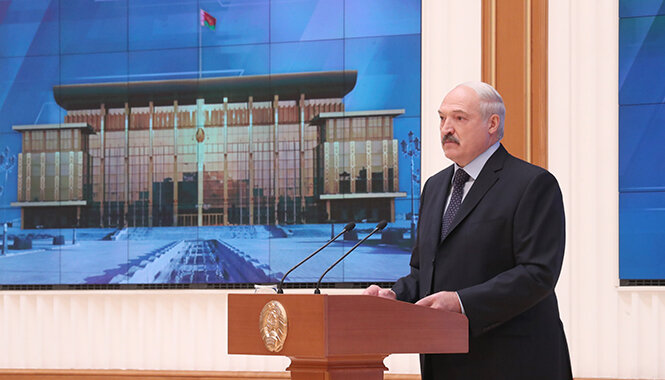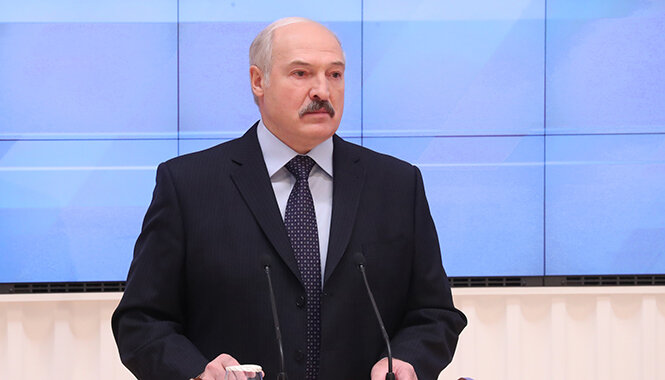Meeting with representatives of business community
- 14
Small and medium-sized enterprises are an important component of sustainable economic development, Belarus President Aleksandr Lukashenko noted as he met with representatives of the business community on 22 December.
“We have discussed the issues of business promotion on many occasions. However, this is the first time we meet in such a broad format. Among those present are representatives of the authorities and business, from artisans to owners of large private companies. We are united by one thing: we clearly understand that small and medium-sized business is a major component of sustainable economic development, and hence the existence of the state,” Aleksandr Lukashenko said.
The President said that looking through the morning media and reading reviews, he found out that some politicized structures feel offended for not being invited to the meeting. “With regard to the complaints of these gentlemen I must say that it is not a political meeting and there are no political campaigns yet. True, the election campaign to the local councils is in progress. So you need to go there and engage in dialogue without pouting. Today I invited the people who do business and who get involved in politics when there are political campaigns. So there is no need to feel offended that not all have been invited to attend the meeting. We could not invite everyone. I suggest we meet those who feel offended during parliamentary, presidential elections, because they have more policy on their mind rather than business,” the head of state said.
This year, on the instructions of the President, government officials and entrepreneurs did a large-scale work to improve the business climate and stimulate business activity in the country. In the autumn Aleksandr Lukashenko signed a package of documents: the ordinance and seven decrees to give a powerful impetus to the development of the private sector. Besides, the President signed the Ordinance “Concerning the development of the digital economy”. The main goal of the document is to create conditions to attract world IT companies to Belarus, to encourage them to open their representational offices and development centers in Belarus and to make in-demand products.
“The second goal of the document is to invest in the future. These are IT workers and education. The third goal is the application of cutting-edge financial instruments and technologies. Leading economies of the world are now familiarizing themselves with this new phenomenon. In fact, Belarus becomes the first state in the world which opens up broad opportunities for the use of the blockchain technology. We have all opportunities to become a regional center of competence in this field,” Aleksandr Lukashenko said.
Moreover, the passing of the decree will help create conditions for the development of the IT sector, acquire unique competitive advantages for the attraction of technologies, capitals, and especially smart and talented people from all over the world. “Alongside with the package of solutions for business, the ordinance should help Belarus promote its progressive development,” Aleksandr Lukashenko said.
A new stage in the relations of business and government bodies began in 2009 when Aleksandr Lukashenko gave an instruction to work out proposals to gradually liberalize economic activities. They were included in the Directive concerning entrepreneurship development and business stimulation which was published in 2010. This conceptual document is still operational. Relying on this document, the government has passed, amended or abolished about 200 legal acts.
“A lot has been done. We have achieved good results. Belarus has moved to the 38th place in the business doing ranking. The progress was obvious. Eight years have passed since then. Today there is a need to take more decisive steps to keep up with the trends that the world economy offers today," the head of state said.
The President stressed that business should be fair. “Creativity, honesty, transparency and maximum responsibility for employees and the society should be the basis of your activity. No ‘grey’ schemes. I believe that criminal cases that involve officials and businessmen cast a shadow both on the authorities and the business community. Criminal activity is a shame. It must be eliminated. I hope we are on the same page on this matter. Otherwise, we have different paths to follow,” Aleksandr Lukashenko said.
“Our task is not to stand in the way of honest businessmen. We should not restrain businessmen and limit their rights to reasonable risk,” the head of state pointed out. It is very important to encourage citizens to work, help them find a job both in the public sector and the private one, the President added.
He also stressed that today SMEs account for a quarter of Belarus’ GDP, a third of investments in the economy, and every third job. “This is quite a number, but we need to increase it,” Aleksandr Lukashenko said.
In this regard, employment is a very important issue, and the government has already done a lot in this field. “Job creation should become the main performance indicator for heads of government bodies,” the Belarusian leader believes.

On business promotion
“Ordinance No. 7 is the key document out of the adopted package. Its goal is to give people the opportunity to develop their business rather than think about the many bureaucratic formalities. You want to do business, you are welcome! There are no more obstacles. You just need to file one document, namely a notification to the executive committee and that’s it! You can get down to work the next day,” Aleksandr Lukashenko noted.
The head of state said that all technical requirements have been minimized and collected in one document. Thus, the number of fire safety regulations has been reduced 11 times, health requirements 13 times, veterinary ones 10 times. Many outdated administrative procedures have been eliminated.
“A new reduced list of administrative procedures for business will be approved if need be,” Aleksandr Lukashenko said.
In his opinion, procedures should be adopted in the electronic format. This especially applies to land and property-related matters, drafting design and construction documents.
The head of state underlined that the government needs to explore how this approach will work for the recently adopted digital economy ordinance. If it benefits the companies, this experience should be emulated nationwide.
On fiscal system
The head of state also spoke about the fiscal system. “Upon my instructions the central government will set up a special group in January and start large-scale remodeling of the Tax Code. It should be simple and understandable. The Tax Code should encourage economic activities instead of forcing commercial entities to look for loopholes in order to avoid fiscal commitments,” Aleksandr Lukashenko remarked.
The President gave instructions to prepare amendments to the Tax Code by September 2018. “There is one requirement: revenues of the state budget must not be reduced. Cut the Tax Code any way you like but the state budget needs higher tax revenues,” he stressed.
The head of state also spoke in favor of seriously reworking accounting and bookkeeping regulations. “They should be simplified. Bookkeeping regulations are still the way they were in the USSR. A very knotty issue. A university degree is not enough to do bookkeeping,” Aleksandr Lukashenko said.
On inspections and responsibility of business
Aleksandr Lukashenko stated that work to straighten out things in this sphere began in Belarus in 2009. “Back then major Belarusian companies complained that inspectors would come one after another. The practice was stopped. At least decisions were made in favor of making integral inspections. The State Control Committee started coordinating them. But, unfortunately, things did not get much better although steps in the right direction were made,” the President said.
“Now as part of scheduled inspections inspectors arrive in swarms and every one of them demands attention,” the head of state noted. Such an inspection can paralyze the company for two to three months. Meanwhile, the inspectors examine the same things as a matter of fact.
The head of state instructed Chairman of the State Control Committee Leonid Anfimov to make sure the decisions to improve oversight and inspection efforts get fulfilled. “Remember that wise organization of the oversight system is a vital factor for bringing in investors. Life itself wants us to optimize the number of inspectors and revise their guidelines. This is why the decree on improving oversight and inspection activities has been passed. It is necessary to shift the focus of auditing agencies towards the prevention of violations,” the President stressed.
Random checks should be organized only if information about violations has been documented. “If your tip fails to produce results, blame yourselves. If you detect violations, issue instructions to fix them unless criminal violations are detected. But keep the company running. Its manager should take responsibility and think how he or she should respond to your remarks,” Aleksandr Lukashenko said.
“It is high time we got rid of the dumb reporting system, which values sums of fines, the number of detected offenses, and the number of criminal cases,” Aleksandr Lukashenko said.
In his words, it feels good when the state budget receives money earned by actions of law enforcement agencies and inspectors. “But consequences of such actions nearly always have a greater effect. The state budget receives much less afterwards than the fines bring. Inspectors and law enforcement agencies should pay more attention to legislation and the punishments legislation specifies. Punishments should be handed out in line with the law. We have to live by law instead of unwritten rules,” the President said.
Aleksandr Lukashenko remarked that fines and other punishments should be commensurate with the nature of the offence and should take into account the economic state of the company. Punishments should have a warning effect.




























